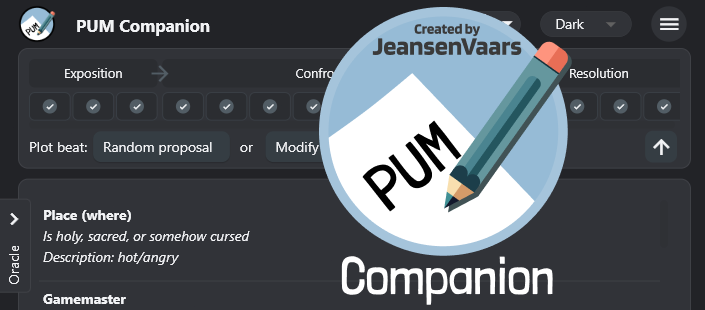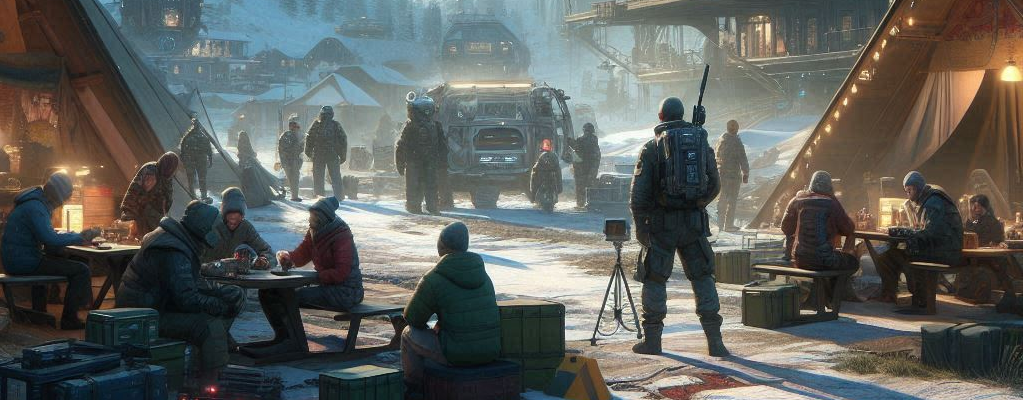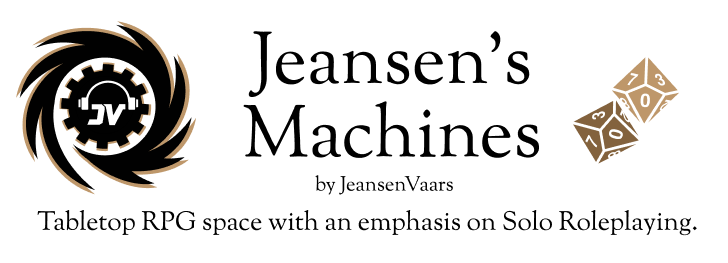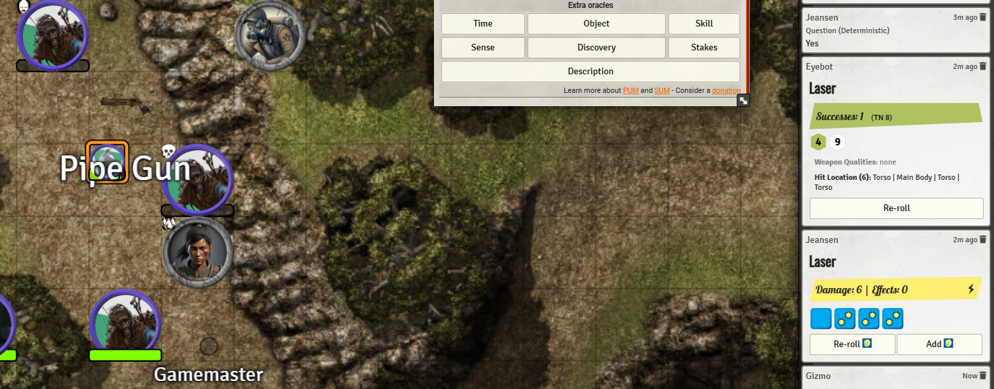Oracles and Plots: Player vs Character Knowledge

After the article I wrote for Craft an Adventure from Scratch in 30 minutes we ended up with a baseline for an adventure. A bunch of characters, protagonists, some evil faction and a driving problem. Now, how much knowledge is good, when playing without a GM? Where is the balance between fun and coherence?
Let see what we’ve got:
- A Dangerous and Powerful Mage as a protagonist, in the hunt for evil Demons
- An Evil Faction in the lookout for the Protagonist
- Evil Demons who want to destroy the world
- Allies how want to help the protagonist
Start Scene: The protagonist would be kidnapped, being transported in a wagon, by paid mercenaries to be taken to the evil faction who want her. Her allies (party) would then intercept the transport and try to rescue her right before the handover.
Minimums of Game Knowledge
That is mostly what I consider a minimum to get us going. I think less than this would be just wild guessing and a constant blank when asking the oracles. Some say they could start a game with less. For others, those who might be using a pre-made setting or doing world building, this is so much little to work with. We don’t know anything yet about the magic system, or the monsters out there, or the geography.
On the plot side, we don’t know why the evil faction is trying to capture the hero alive (because I guess they figured she would never agree willingly to their terms), and also we don’t know why is the hero hunting demons, or what is preventing her from doing it.
So, would this be a minimum to get started? Let’s dive in!
| Knowledge | Concept | Advantages | Disadvantages |
|---|---|---|---|
| A. Full Knowledge | Know all factions motivations, plans and actions, risks, location. | Perfect context for oracle interpretation, more coherency. Plot control. | We might fall in trap holes. Overthinking it. Never starting. |
| B. Synchronized Knowledge | Know the same as the Characters. Perception Based. Randomized Locations. | Roll with the flow, and get surprised! | Might go blank on unexpected twists and turns. Might fall into incoherence. |
| C. Gray-Scale Knowledge | Know lightly what the factions want, and what they are currently doing about it. Region aspects. | Context for oracle interpretation, improvisation with authorship. | Might get stuck when linking random events with known facts |
Type A. Full Knowledge: Motivations, Coherence… and Plot Holes!
This is somewhat my default for playing, but I am challenging it. Because in order to know how the NPCs would react and behave, I would need to know why and what do they want. But do I really need to know that much?
The game started with a battle, and that’s easy. Just defeat the bad boys. But at the end of it, a chance for interrogation happens, and bam. I went blank! Why? Well I felt I had to figure out what the evil faction wanted, why and what was the relationship with the demons, so I could make a cohesive story.
- She was captured because she has special powers they want to use to bind demons
- She was captured because she has to be sacrificed in a ritual to use her powers
- She was captured to be offered to the demons in exchange for power
If the evil boys would capture her because they have a dealing with the demons, then they would want to go to them, so it collided with the idea of them looking for her. Since no one is hiding from each other, then there is no “looking for her” anymore. Or could that work out but in a way to play with imperfect information, where one party would not know the other would want to meet? I am overthinking it!
In a way, this is the danger of Type A, we can set up a game where we know everyone’s motivations, to focus on getting a coherent story, but we need to be careful of doing it right, and before the game get’s started, without predefining it. So we don’t get demotivated or discouraged as soon as we realize things don’t make sense because we threw something incoherent.
The benefit of this Knowledge type, however, is that we will have much more context when interpreting oracles, because we know the important factions interests and motivations. So things will flow naturally, at the cost of surprise factor. We are playing a Player as an audience, we have our characters who don’t know what we know, and we have NPCs that we do know.
Knowledge Type A is closely related to what group GMs actual prep looks like. We present the players a world with things going on, and things somehow need to fit together. Players can only do suspension of disbelief up to a certain limit. They won’t like it when everything they guess is outright wrong or incompatible with previous facts.
Type B: Synchronized Knowledge
On the other hand, we could just roll on with Character’s point of view. Basically we will have to live and accept the fact that the plot, the story and the motivations are not yet clear, nor known, and see what going with the flow brings.
This is very easy, but it brings the dangers of random walking, basically going with the flow, and recursively make sense of things as they happen, while connecting the dots with past events. Here context will help a lot, but might also bring some blank state when we have really no idea or direction as to where things can go to, or come from.
The Mage and her allies win the fight, and capture the driver of the wagon, in which the protagonist was being kidnapped. The first question is likely be: “Who are you, and why did you kidnap me!?” that is a huge question already, and actually game-defining.
If we are on Knowledge Type B, then we roll with the flow and ask Mythic. Does the captive know anything? If yes, will he resist giving it away? If Characters overcome intimidation, what is the answer? We can either go with an Action Question, or use something like UNE Motivations to figure out what they are trying to do.
Of course, the captured person might not necessarily have the full picture of the evil plans! So we can start small this way. Let’s assume the answer is Heal Good (that is what I just rolled), and I figured, the evil faction thinks they are doing a good thing by capturing her. And That’s it. Don’t ask. Any. More. Questions! 🙂
Is it enough to get PCs going? That should be all that’s needed. Let say with this information, the PCs now learned about a new enemy, aside from the Demons, and will have to be careful with assassins and agents, while they continue to hunt Demons on their way, but these will become a stone on the way for now.
This is not an issue, whether you are controlling a single PC or a PC Party, you may not know more than the most knowledgeable Character out there. The only goal here is to focus on what characters perceive with their senses. Enemy has black robes? Alright, roll Lore, they might be from a known cult!
Type C: Gray-Scale Knowledge
Of course, this is not a binary topic. The question is, as this title says, How much knowledge is right? We’ll have to figure that out. To me, a good baseline is the one described in the 30 minutes adventure article, plus a What question, for general motivations. What do they want, and what are they openly doing right now about it? Leaving the Why outside!
The “what” is a great gray-scale impulse, it can provide actions and some motivation aspects to know just enough how they would behave if they show up suddenly at any time during the adventure. And it will be less likely that you run blank, or suffer tying the dots later on.
We know the evil faction is trying to capture the PC alive. What will be trying out? Setting up traps, manipulate her family and friends, sending agents to knock her out!. This knowledge the PCs may not directly know, but they will very soon figure that out. So that is a gray-scale knowledge. Knowledge that is right now imminent. This gives already interpretation context help! If you get Cause Harm, well, you’ll know right away what that is.
Getting a blank mind, is in one of my opinion, the biggest show-stopper of a GMless game. It is quite discouraging to be unable to tie three or more facts together, trying to make sense of them. And even worse, if an inconsistency is found, that clashes to the logic of the game, or the behavior of the world. So describing the “what” can help a lot, in front of fully improvised type B.
Most of my abandoned games were because of this. I did really not know what someone would do next, or what would happen next. Or figure out why did they do it, so it makes sense? Sometimes playing in pure Type B mode can lead to blanks because we have less information in our head for context.
Wrapping up: Knowledge Types – Which one is for you?
Remember to ask yourself, who is your audience? If it’s you who is having fun, then think what is most fun for you. To be surprised? Then you might want to pick B. If your audience are the readers, perhaps coherency and consistency are better, and you are using the mechanics to tell a story.
| Type | Questions | Example |
|---|---|---|
| A. Full Knowledge | What do they want? What are they doing about it? Why do they want it? What is stopping them from getting it right away? | The Tadessus want to capture the PC alive, so they can sacrifice her to bind the Demons to their will. The Demons don’t know this yet, so this could be something for the PC to figure out. |
| B. Synchronized Knowledge | What are they doing right now that the characters can notice? | Some Evil Guys are trying to capture the PC. So far we only know they have dangerous agents with superb archery skills |
| C: Gray-Scale Knowledge | What is they biggest most public motivation? What are their current ongoing plans? | The Tadessus faction are sending agents to capture the PC alive. If all fails, they will try to extort her through her friends, family, etc. The Demons are manipulating the Tadessus and intimidating them. It is not yet known why or in exchange of what. |
Article Comments
This article idea was brought up after a very interesting discussion with Thessius and Murmur in the Mythic Game Master Emulator Discord Channel. Interesting opinions were exchanged. Join us there!






